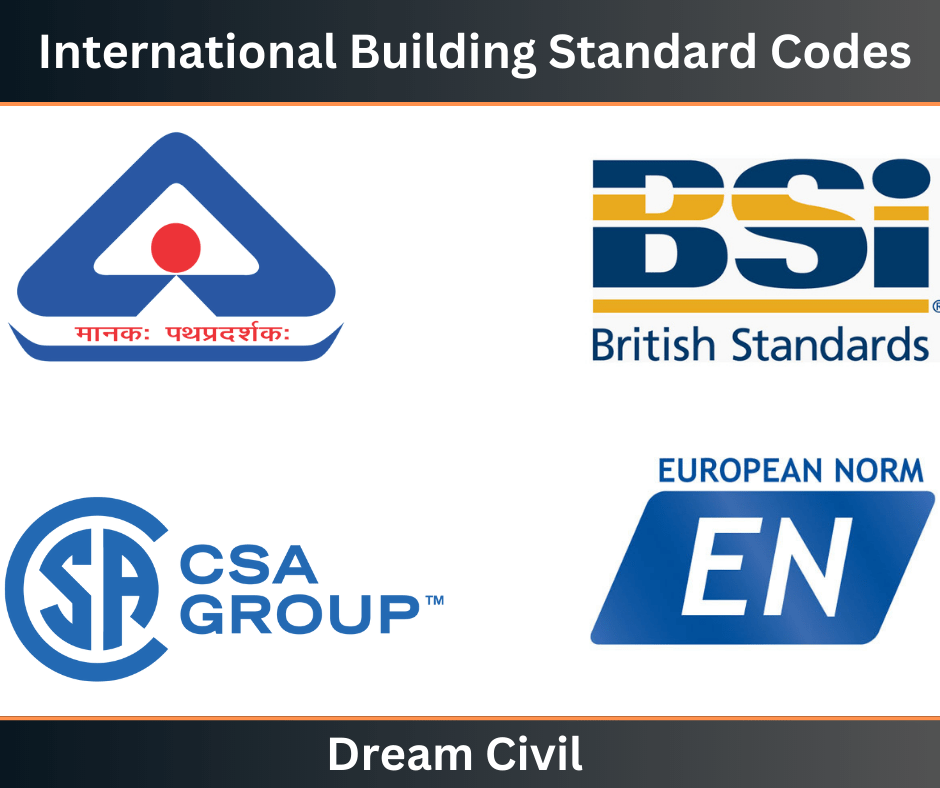Table of Contents
To have quality and durability construction work there are certain rules and standards codes provided by different institutes that may differ from one country to another. International Building Standard Codes are very essential for engineers and also for owners to check the quality of construction.
1. International Building Standard Codes
Following are the International Building Standard Codes which are commonly employed all over the world for building construction and other works;
a. ASTM International
b. Canadian Standard Association (CSA)
c. European Standard (EN Eurocodes)
d. British Standards (BS)
a. ASTM International
a. ASTM Institute has the biggest collection of international standards and codes in the world for materials, goods, services, and systems.
b. Institute also provides hard and soft documents on sampling and testing methods for health, safety, and performance elements of materials, effects of physical and biological agents and chemicals, and safety guidelines.
The following data provides a checklist of standards for testing different construction materials.

American Society for Testing and Materials contains the following code for material and testing.
1. Soil
ASTM D4318, ASTM C136, ASTM D5268, ASTM D6913, ASTM D2974, ASTM D422, ASTM D2434, ASTM D1140, ASTM D7263, ASTM D5918, ASTM D698, ASTM D854, and ASTM D1557, ASTM D2216
2. Aggregate and Rock
ASTM C295, ASTM C127, ASTM D5312, ASTM C128, ASTM D5313, ASTM C29, ASTM D4992, ASTM D5821, ASTM D4791, ASTM D3967, ASTM C131, ASTM D7012, and ASTM C535ASTM C88
3. Concrete and Masonry
ASTM C617, ASTM C1231, ASTM C39, ASTM C78
4. Asphalt
ASTM D6926, ASTM D2726, ASTM D6307, ASTM D5444, and ASTM D2041
b. Canadian Standard Association
The Canadian Standard Association is a standard organization that prepares standards & codes in Canada.
It gives standards in hard print and soft form and gives training and advisory services.
The material employed in Building construction and other structures in Canada must follow the needs of the CSA standards.
The following data delivers set standards employed for testing various construction materials.

Some necessary CSA Standards for testing construction materials:
1. Cement
CSA A3002, CSA A3003, CSA A3004, and CSA A3005, CSA A3001
2. Concrete
CSA A23.2, CSA A23.4, and CSA S806, CSA A23.1
3. Masonry
CSA A165.2, CSA A165.3, CSA A179, CSA A370, and CSA A371, CSA A165.1
c. EN Standard (Eurocodes)
Eurocodes are the standards code portion of the comprehensive system of European standards connecting to construction.
They are employed for the determination of material and product properties needed for the design of buildings and other civil engineering structures with the EN Eurocodes.
The codes and standards provided in Eurocodes contain testing for materials like cement, masonry, timber, and metallic materials, non-destructive test methods as well as fire tests.
British Standards EN is an abbreviation for the official English version of European standards.

The European Standards for testing various construction materials:
1. Concrete
BS EN 12390-5:2000, BS EN 12390-6:2000, BS EN 1170-4:1998, BS EN 12390-4:2000
2. Masonry
BS EN 846-5:2000, BS EN 846-6:2000, BS EN 1052-1:1999
3. Timber
EN 594, EN 1075, EN 1380
4. Metallic Materials
BS EN 10002-1:2001
5. Plywood
BS EN 1072:1995
6. Stone
BS EN 14617-15:2005, BS EN 14580, BS EN 14617-2:2004, BS EN 12372:1999
7. Aggregate
BS 812-2:1995
d. BS Standards for Materials & Material Testing
BS publications, which are prepared by the British Standard Institute, are technical specifications that provide guidance on broad coverage of building and construction issues containing materials, testing, health and safety, access and regulations, etc.
They are an essential reference for architectural experts, developers, building owners, site managers, supervisors, building contractors, structural engineers, and materials specifiers.

The following list delivers a set list of British Standards for testing construction materials as mentioned below:
1. Concrete
BS 1881-119:1983, BS 1881-121:1983, BS 1881-127:1990
2. Resin and polymer/cement compositions
BS 6319-10:1987, BS 6319-11:1993, BS 6319-2:1983, BS 6319-3:1990, BS 6319-6:1984, BS 6319-7:198
3. Mortar
BS EN 1015-11:1999, BS EN 1015-12:2000,
e. Indian Standards (IS)
IS Code owns a massive number of documents issued by the Bureau of Indian Standards (BIS) and concerns almost all parts of civil engineering.
The British Indian Standard contains originated a set of guidelines in order to guarantee the quality standards of the different types of construction materials.

These are organized into different categories;
i. Building Materials including Paints
ii. Civil Engineering Design and Construction
These standards provide guidelines for testing cement, concrete, concrete admixtures, additives, soil, rock, steel, and aluminum.
The following are the Indian Standards for testing construction materials:
1. Cement
IS 650 – 1991, IS 14032 – 1988,
2. Coarse / Fine Aggregate
IS 2386 (Part I To VIII) 1963
3. Bricks
IS 3495 (Parts I to IV) 1976
4. Soil
IS: 2720 (Part. XIII) 1986, IS:2720 (Part.30) 1980
This was for the International Building Standard Codes.
2. References1. Content Filter & Authenticity Checking Team, Dream Civil International (Our team checks every content & detail to maintain quality.) |
Read Also: Types of Concrete Finishes

